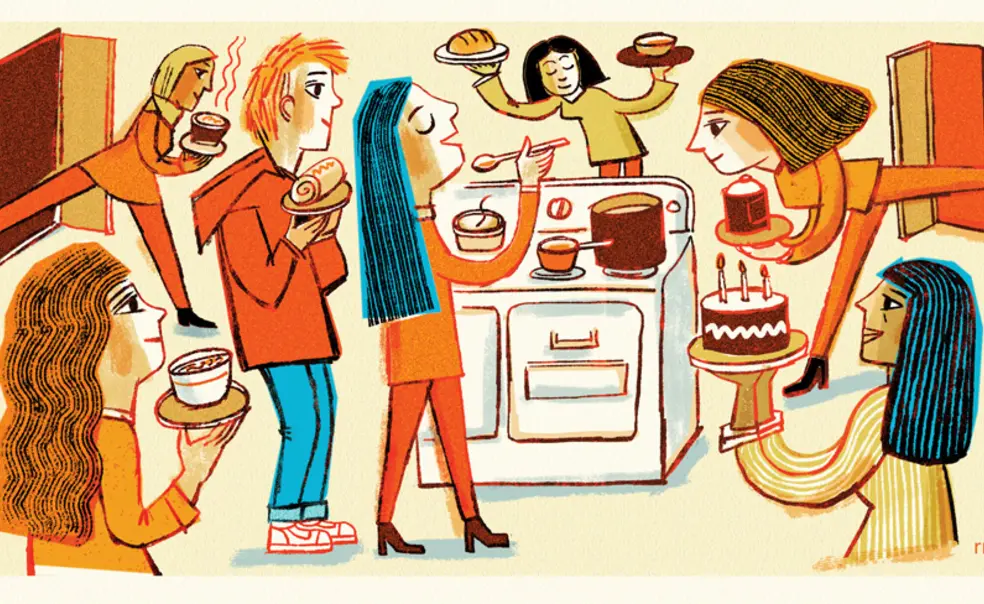Independent Students Find Community Away from ‘The Street’
For many independent students, co-ops offer a way to maintain the routine of eating with friends
For her birthday, Vanessa Rivkin ’25 invited seven friends to her spacious common room in Spelman Hall. She placed orders for her guests at Alfalfa, a Nassau Street restaurant, and brought the salads back to her room. Guests came with food from their co-ops or kitchens, others brought gifts, and they all gathered for a potluck-style dinner. “That is the perfect way to spend my birthday,” she said.
Spelman is on the opposite side of campus from Prospect Avenue, where, this February, sophomores flocked in record numbers to join one of the 11 eating clubs on “The Street.”
Those who opt out of “Street Week” may choose to eat in the dining hall as upperclassmen, or, like Rivkin and her three roommates, go independent. This academic year, 325 students pledged independent, while 500 juniors and seniors stayed on the University meal plan, according to the Office of Communications. (The numbers have been fairly consistent over time, though they fluctuate during the year.) Independent students take on the challenge of budgeting, planning, and preparing meals for themselves, not to mention finding community away from Princeton’s dominant social scene.
Alexa Marsh ’25 decided to go independent after she spent her sophomore spring in Italy, missing out on Street Week. She was indifferent to the social scene on The Street, and the limited University dining plan seemed to offer little social benefit for its price, $3,234 per semester. Calm and straightforward, Marsh explained that “when your friends are mostly in eating clubs or in a co-op, you can’t really dine with them.”
Dining is a central part of the social experience at Princeton. For many independent students, co-ops offer a way to maintain the routine of eating with friends. At Princeton’s four main co-ops, with membership ranging from 10 to 50 students, members build community through cooking and sharing meals. “It definitely is a bonding experience,” said Rivkin, who was part of International Food Co-op for a year and a half.
Marsh ultimately preferred the flexibility of eating what she wants, when she wants. But cooking for herself, along with maintaining friendships as an independent student, required creativity. As a junior, Marsh lived in Patton Hall with a kitchen that was shared, ill-equipped, and — her word — grimy. “No one would go down there,” she said. She made do with canned soup and microwaveable food. She bought meals from the Food Gallery at Frist Campus Center, occasionally found snacks through Princeton’s Free Food Listserv, and made use of the two weekly dining hall swipes allotted to all upperclassmen. “There were workarounds,” she said.
After deciding to move into Spelman this fall, Marsh’s experience as an independent student transformed. Spelman’s apartment-style dorms are designed to accommodate independent students. More than 200 students currently reside at Spelman, and the vast majority — over 150 — are independent. Marsh and her three roommates share a typical Spelman kitchen with a full-sized fridge, a stove, an oven, a microwave, and ample pantry space. As Marsh opened the fridge to reveal last night’s pizza box, her roommate stood at the stove with headphones on, spooning a dollop of soy paste into a small pot of noodles and bok choy. “We have a table, so it feels like an apartment,” Marsh said, “whereas that fall it was just me trying to get by.”
Still, life as an independent student can feel isolating. Marsh knows she is missing out on the daily gatherings around meals that eating clubs make routine. The dining hall had made it easy to maintain friendships, and after going independent, Marsh lost touch with some people she used to catch up with over meals.
But she has learned to become more intentional about socializing, often planning to study with friends before having dinner alone. “While I recognize that I did miss out on something that is very valuable to a lot of people’s experiences, I think I just went through Princeton in a little bit of a different way,” Marsh said. “That was the way that was right for me.”












No responses yet